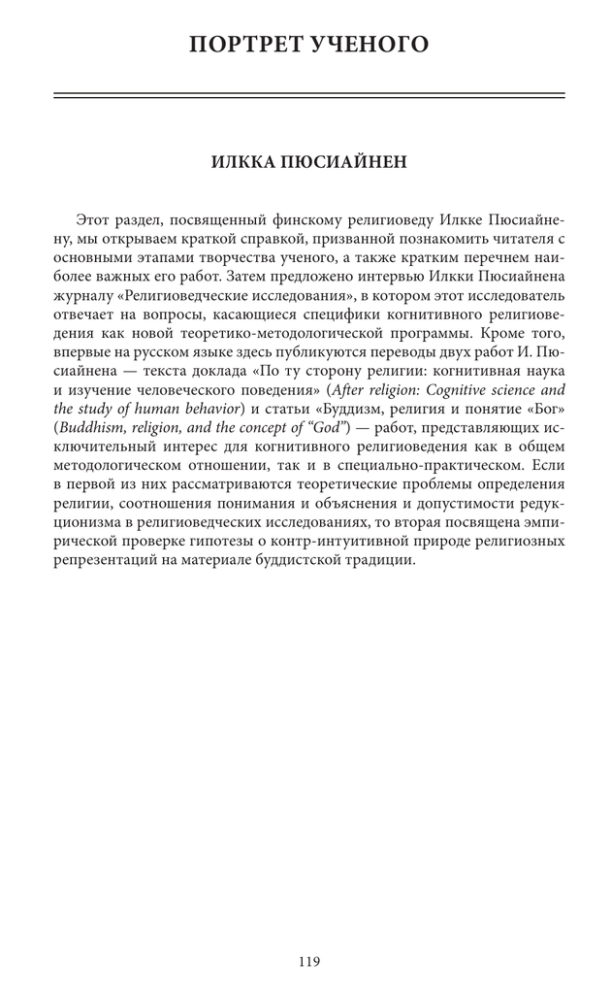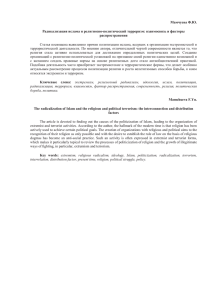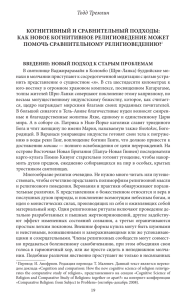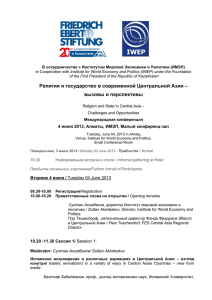Малевич Т.В. Биобиблиографическая справка
реклама

ПОРТРЕТ УЧЕНОГО ИЛККА ПЮСИАЙНЕН Этот раздел, посвященный финскому религиоведу Илкке Пюсиайнену, мы открываем краткой справкой, призванной познакомить читателя с основными этапами творчества ученого, а также кратким перечнем наиболее важных его работ. Затем предложено интервью Илкки Пюсиайнена журналу «Религиоведческие исследования», в котором этот исследователь отвечает на вопросы, касающиеся специфики когнитивного религиоведения как новой теоретико-методологической программы. Кроме того, впервые на русском языке здесь публикуются переводы двух работ И. Пюсиайнена — текста доклада «По ту сторону религии: когнитивная наука и изучение человеческого поведения» (After religion: Cognitive science and the study of human behavior) и статьи «Буддизм, религия и понятие «Бог» (Buddhism, religion, and the concept of “God”) — работ, представляющих исключительный интерес для когнитивного религиоведения как в общем методологическом отношении, так и в специально-практическом. Если в первой из них рассматриваются теоретические проблемы определения религии, соотношения понимания и объяснения и допустимости редукционизма в религиоведческих исследованиях, то вторая посвящена эмпирической проверке гипотезы о контр-интуитивной природе религиозных репрезентаций на материале буддистской традиции. 119 БИОБИБЛИОГРАФИЧЕСКАЯ СПРАВКА1 Известный финский религиовед Илкка Эльяс Пюсиайнен (Ilkka Eljas Pyysiäinen) родился 9 июля 1959 г. В 1983 г. получил степень магистра теологии, в 1988 г. — степень лиценциата в области теологии и сравнительного религиоведения в Хельсинском университете (University of Helsinki). В 1993 г. защитил докторскую диссертацию «За пределами языка и разума. Мистицизм в индийском буддизме»2. Основной сферой его научных интересов является когнитивное религиоведение: в своих работах он охватывает обширный ряд вопросов, касающихся специфики религиозной категоризации, эпистемологии религиозных репрезентаций, когнитивных механизмов религиозного опыта и т.п. В настоящий момент И. Пюсиайнен преподает на отделении сравнительного религиоведения факультета теологии Хельсинского университета, является приглашенным экзаменатором Университета Куинс (Queen’s University, с января 2011 г.), членом различных научных организаций, в том числе финской ассоциации «Скепсис» (“Skepsis”, с ноября 2009 г.) и Международного института познания и культуры (International Cognition and Culture Institute, с октября 2008 г.). Кроме того, И. Пюсиайнен участвует в реализации проводимых в рамках когнитивного религиоведения исследовательских программ. В частности, именно он с 2001 по 2003 гг. руководил проектом «Роль сознания и общества в распространении религии» (Mind and Society in the Transmission of Religion), финансируемым Академией Финляндии (Academy of Finland), а согласно предоставленной Хельсинским университетом отчетности за 2005-2010 гг., благодаря его деятельности Хельсинки стал «одним из мировых центров когнитивного религиоведения»3. Авторству И. Пюсиайнена принадлежит множество научных статей и ряд монографий — среди них ставшие классикой когнитивного религиоведения «Как работает религия: к вопросу о новом когнитивном религиоведении»4 и «Сверхъестественные агенты: почему мы верим в души, богов и будд»5, а также многочисленные популярные статьи и книги, в том числе привлекшие внимание общественности работы на фин1 При подготовке биобиблиографической справки использовались следующие информационные ресурсы: URL: http://fi.linkedin.com/pub/ilkka-pyysiäinen/43/ab4/306 (дата обращения: 28.08.2012); URL: https://tuhat.halvi.helsinki.fi/portal/en/persons/ilkkapyysiainen(a0a866af-c55f-4ade-b981-4860569f33b2).html (дата обращения: 28.08.2012); URL: http://pyysiainen.wordpress.com/ (дата обращения: 28.08.2012). 2 Pyysiäinen I. Beyond language and reason: Mysticism in Indian Buddhism. — Helsinki: Academia Scientirarum Fennica, 1993. 3 International evaluation of research and doctoral training at the University of Helsinki 20052010: RC-Specific Evaluation of FC — The formation of Christianity: Historical, social and cognitive perspectives / Ed. by Saari S., Moilanen A. — Helsinki: University of Helsinki, 2012. — P. 2. 4 Pyysiäinen I. How religion works: Towards a new cognitive science of religion. — Leiden: Brill, 2001. 5 Idem. Supernatural agents: Why we believe in souls, gods and buddhas. — New York: Oxford University Press, 2009. 120 ском языке «Грех в мыслях, словах и делах»1 и «Бога нет»2. Кроме того, под редакцией И. Пюсиайнена вышло несколько сборников, отражающих его широкий круг интересов: от истории религии и когнитивного религиоведения3 до анализа социально-экономических аспектов религиозных практик4. ОСНОВНЫЕ ТРУДЫ: Монографии: Pyysiäinen I. Perimmäiset kuvat: Buddhan elämäkerran merkitys theravadan kaanonissa [Предельные образы: Биография Будды в тхеравадском каноне]. — Helsinki: Missiologian ja ekumeniikan seura, 1988; Pyysiäinen I. Beyond language and reason: Mysticism in Indian Buddhism. — Helsinki: Academia Scientirarum Fennica, 1993; Pyysiäinen I. Belief and beyond. Religious categorization of reality. — Åbo: Åbo Akademi, 1996; Pyysiäinen I. Jumalan selitys: “jumala” kognitiivisena kategoriana [Объяснение Бога: «Бог» как когнитивная категория]. — Helsinki: Otava, 1997; Pyysiäinen I. How religion works: Towards a new cognitive science of religion. — Leiden: Brill, 2001; Pyysiäinen I. Magic, miracles, and religion: A scientist’s perspective. — Walnut Creek: AltaMira Press, 2004; Pyysiäinen I. Supernatural agents: why we believe in souls, gods and buddhas. — New York: Oxford University Press, 2009. Статьи: Pyysiäinen I., Ketola K. Rethinking “god”: “God” as category in comparative religion // Approaching religion / Ed. by Ahlbäck T. — Pt. 1. — Åbo: Donner Institute, 1999. — P. 207-214; Pyysiäinen I. God as ultimate reality in religion and in science // Ultimate Reality and Meaning. — Vol. 22/2 (1999). — P. 106123; Pyysiäinen I. Phenomenology of religion and cognitive science: The case of religious experience // Temenos. — Vol. 35-36 (1999-2000). — P. 125-153; Pyysiäinen I. Cognition, emotion, and religious experience // Religion in mind: Cognitive perspectives on religious belief, ritual and experience / Ed. by Andresen J. — Cambridge: Cambridge University Press, 2001. — P. 70-93; Pyysiäinen I. Mind and miracles // Zygon. — Vol. 37/3 (2002). — P. 729-740; Pyysiäinen I. Religion and the counter-intuitive // Current approaches in the cognitive science of religion / Ed. by Pyysiäinen I., Anttonen V. — London: Continuum, 2002. — P. 111-133; Pyysiäinen I. Buddhism, religion, and the concept of “god” // Numen. — Vol. 50/2 (2003). — P. 147-171; Pyysiäinen I., Lindeman M., Honkela T. Counterintuitiveness as the hallmark of religiosity // Religion. — Vol. 33/4 (2003). — P. 341-355; Pyysiäinen I. Folk religion and 1 Idem. Synti: ajatuksin, sanoin ja töin. — Helsinki: WSOY, 2005. Idem. Jumalaa ei ole. — Helsinki: Vastapaino, 2010. 3 См., например: Explaining Christian origins and early Judaism: Contributions from cognitive and social science / Ed. by Luomanen P., Pyysiäinen I., Uro R. — Leiden: Brill, 2007; Current approaches in the cognitive science of religion / Ed. by Pyysiäinen I., Anttonen V. — London: Continuum, 2002; Uskonto ja ihmismieli. Johdatus kognitiiviseen uskontotieteeseen [Религия и человеческое сознание: Введение в когнитивное религиоведение] / Ed. by Ketola K., Pyysiäinen I., Sjöblom T. — Helsinki: Gaudeamus, 2008. 4 См.: Religion, economy, and cooperation / Ed. by Pyysiäinen I. — Berlin: Mouton de Gruyter, 2010. 2 121 theological correctness // Temenos. — Vol. 39-40 (2004). — P. 151-165; Pyysiäinen I. God: A brief history with a cognitive explanation of the concept // Temenos. — Vol. 41/1 (2005). — P. 77-128; Pyysiäinen I. Religious conversion and modes of religiosity // Mind and religion: Psychological and cognitive foundations of religiosity / Ed. by Whitehouse H., McCauley R. N. — Walnut Creek: AltaMira Press. — P. 149-166; Pyysiäinen I. Amazing grace: religion and the evolution of the human mind // Where God and science meet: how brain and evolutionary studies alter our understanding of religion / Ed. by McNamara P. — Vol. 1: Evolution, genes and the religious brain. — Westport: Praeger Publishers, 2006. — P. 209-225; Luomanen P., Pyysiäinen I., Uro R. Introduction: social and cognitive perspectives in the study of Christian origins and early Judaism // Explaining Christian origins and early Judaism: Contributions from cognitive and social science / Ed. by Luomanen P., Pyysiäinen I., Uro R. — Leiden: Brill, 2007. — P. 1-33; Pyysiäinen I. Ritual, agency, and sexual selection // The evolution of religion: Studies, theories, and critiques / Ed. by Bulbulia J., Sosis R., Harris E., Genet R., Genet C., Wyman K. — Santa Margarita, CA: Collins Foundation Press, 2008. — P. 175-180; Pyysiäinen I., Hauser M. The origins of religion: evolved adaptation or by-product? // Trends in Cognitive Sciences. — Vol. 14/3 (2010). — P. 104-109; Pyysiäinen I. How religion resists the challenge of science // Skeptical inquirer. — Vol. 34/3 (2010). — P. 39-41; Pyysiäinen I. Reduction and explanatory pluralism in the cognitive science of religion // Changing minds: Religion and cognition through the ages / Ed. by Czachesz I., Bíró T. — Louvain: Peeters, 2011. — P. 15-30; Pyysiäinen I. Putting cognition and culture back together again: Religion in mind and society // Method and Theory in the Study of Religion. — Vol. 24/1 (2012). — P. 29-50. Т. В. Малевич 122


